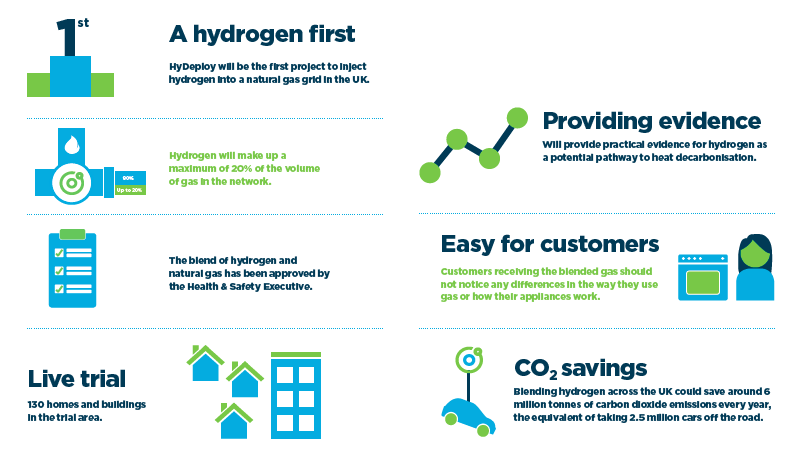A ground-breaking green energy trial that could help Britain dramatically cut its carbon emissions and open the door to a low-carbon hydrogen economy has been given the go-ahead by the Health and Safety Executive (HSE).
In the first trial of its kind in the UK, the HyDeploy project will inject hydrogen into an existing natural gas network.
Hydrogen is a carbon-free gas that when burned produces just heat and water and has been mooted as a potential solution to tackling one of the country’s biggest sources of carbon emissions – heating homes and businesses.
Backed by Ofgem’s Network Innovation Competition, the £7 million project is being led by gas network Cadent, in partnership with Northern Gas Networks, Keele University and a consortium of technical experts.
In a year-long pilot, due to start next year, HyDeploy will blend up to 20% of hydrogen (by volume) with the normal gas supply in part of Keele University’s gas network. Customers will continue to use gas as they do today, without any changes needed to gas appliances or pipework.

Simon Fairman, Director of Safety and Network Strategy, Cadent, said: “The importance of this trial to the UK is unmeasurable .This is the first ever practical demonstration of hydrogen in the modern gas network in the UK. Hydrogen has the potential to address one of the most difficult sources of carbon emissions – heat. This trial could pave the way for a wider roll out of hydrogen blending, enabling us to begin cutting carbon emissions from heat as early as the mid-2020s, without customers needing to change their gas appliances or behaviour.
“HyDeploy could also prove to be the launchpad for a wider hydrogen economy, fuelling industry and transport and bringing with it new jobs. The recent report of the Intergovernmental Panel on Climate Change underlines the need for urgent action on carbon emissions and HyDeploy is an important staging post on that journey in the UK.”
Mark Horsley, Chief Executive, Northern Gas Networks, said: “Hydrogen is a key piece of the decarbonisation jigsaw, and this landmark decision allows us to take a huge leap forwards in terms of its use in meeting climate change targets.
“The HyDeploy project allows us to start making a difference to emissions today and we’re very excited to be a part of it.”
Professor Mark Ormerod, Deputy Vice Chancellor and Provost at Keele University, said: “Energy and sustainability is a key overarching institutional priority for Keele University, and we are delighted to be a partner in this important, highly relevant and prestigious project. HyDeploy will tackle one of the major societal challenges and has the potential to be highly impactful and lead to a significant reduction in carbon emissions.”
The trial will take place on part of Keele University’s private gas network, serving 17 faculty buildings and 100 domestic properties.
The hydrogen will be produced by electrolysis. Electrolysers, produced by hydrogen systems manufacturer ITM Power, use an electrical current to split water molecules into hydrogen and oxygen. The electrolyser for HyDeploy will be powered by renewable energy sources. Construction is due to start at the end of this year.
The HSE granted HyDeploy an exemption to the current limit of 0.1% hydrogen in the UK gas network after the project gathered extensive evidence to demonstrate the hydrogen blend would be ‘as safe as natural gas’. The exemption is similar to that granted to allow the first bio-methane producers to inject biogas into the natural gas network.
Gas safety checks were carried out in the homes and buildings in the trial area. Laboratory tests were carried out on a range of gas appliances as well as extensive research on the effect of hydrogen on the different materials found in the gas network. The Health and Safety Laboratory has been overseeing all safety aspects of HyDeploy, providing expert impartial advice to the project.
Keele University was viewed as the perfect test site, owning and operating its own private gas network, independent of the UK’s wider gas network. The University is working with businesses, academics and graduates to create Europe’s first ‘at scale’ multi-energy-vector smart energy network demonstrator – where new energy-efficient technologies can be researched, developed and tested in a real world environment.
HyDeploy is led by Cadent in partnership with Northern Gas Networks, Keele University, the Health and Safety Laboratory (HSL), integrated hydrogen energy systems manufacturer ITM Power, and independent clean energy company Progressive Energy. It is supported by testing, inspection and certification world leaders KIWA Gastec and specialist engineering consultancy Otto Simon.
Fast facts
- Heating homes and industry accounts for nearly half of all energy use in the UK and one third of the country’s carbon emissions.
- If hydrogen were blended with natural gas across the UK at a similar level to HyDeploy, it could save around 6 million tonnes of carbon dioxide emissions every year, the equivalent of taking 2.5 million cars off the road.
- Hydrogen was a major component in ‘town gas’, gas created from coal and used widely throughout Britain before the discovery of North Sea gas in the 1960s. Up to 60% of the gas (by volume) being used by consumers was hydrogen.
- Across Europe, permitted levels of hydrogen in the gas supply vary, from 0.1% in the UK to up to 12% in parts of the Netherlands
To find out more visit www.hydeploy.co.uk.




